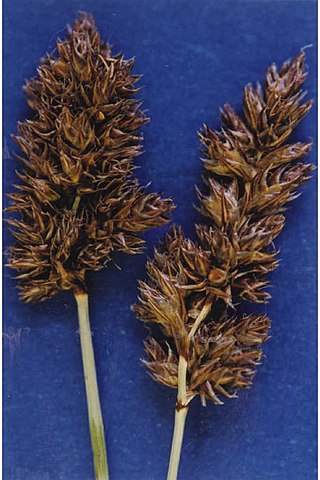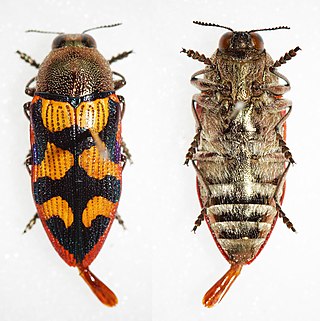
Echinacea simulata, commonly called wavy leaf purple coneflower, glade coneflower, or prairie purple coneflower, is a species of perennial flowering plant in the family Asteraceae. It is native to the east-central states of the United States. Its natural habitat is dry, calcareous, open areas such as barrens and woodlands.

Carex simulata is a species of sedge known by the common name analogue sedge.

Xerocrassa simulata is a species of air-breathing land snail, a terrestrial pulmonate gastropod mollusk in the family Geomitridae.

Euxoa simulata is a moth of the family Noctuidae. It is found from British Columbia down to California.

Marginella simulata is a species of sea snail, a marine gastropod mollusk in the family Marginellidae, the margin snails.
Goya simulata is a species of snout moth in the genus Goya. It was described by Jay C. Shaffer in 1989 and is known from Brazil.

Coptotriche is a genus of moths in the family Tischeriidae, described by the English politician and amateur entomologist, the 6th Baron Walsingham in 1890.
Eois simulata is a moth in the family Geometridae. It is found in Colombia.
Hypocrita simulata is a moth of the family Erebidae. It was described by Francis Walker in 1866. It is found in Colombia.
Cochylimorpha simulata is a species of moth of the family Tortricidae. It is found in Iran.
Tillandsia simulata, common name Florida airplant or Manatee River airplant, is a plant species endemic to Florida. It an epiphyte growing on the branches of various trees and shrubs in the region, mostly in swamps and other moist locations.

Pterolophia is a genus of longhorn beetles of the subfamily Lamiinae, containing the following species:
Dichomeris simulata is a moth in the family Gelechiidae. It was described by Ronald W. Hodges in 1986. It is found in North America, where it has been recorded from Texas, Georgia and Florida.

Coryphopteris simulata, synonym Thelypteris simulata, is a species of fern native to the Northeastern United States. It is known by two common names: bog-fern and Massachusetts fern. It is often confused with the silvery spleenwort, New York fern, and the marsh fern due to similarities in shape and size.
Acmaeodera simulata is a species of metallic wood-boring beetle in the family Buprestidae. It is found in North America.

Thelymitra simulata, commonly called the collared sun orchid, is a species of orchid that is endemic to south-eastern Australia. It has a single fleshy, channelled leaf and up to six blue flowers with small darker spots. It grows in higher altitudes places part and the flowers have a purple lobe with a yellow tip on top of the anther.
Bossiaea simulata is a species of flowering plant in the family Fabaceae and is endemic to inland areas of Western Australia. It is a compact shrub with sharply-pointed cladodes and yellow, pea-like flowers sometimes with red markings.

Castiarina simulata is a species of beetle in the jewel beetle family, Buprestidae, found in Western Australia, South Australia and Victoria.
Parapercis simulata is a fish species in the sandperch family, Pinguipedidae. It is found in the Red Sea and the Western Indian Ocean.
Peckoltia simulata is a species of catfish in the family Loricariidae. It is native to South America, where it occurs in the Oyapock River in French Guiana. The species is typically found in small forested creeks with a substrate of gravel or sand, as well as rocks, leaves, and wood. It has been collected alongside a variety of other species, including other loricariids belonging to the genera Ancistrus, Farlowella, Guyanancistrus, Otocinclus, and Rineloricaria.









